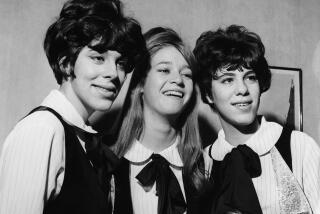Housewife Gets Out of the House, Into the Record Biz
- Share via
Florence Greenberg’s story as founder and guiding spirit of Scepter Records in the ‘50s, ‘60s and ‘70s is probably as colorful as that of any of the label’s many hit acts.
Greenberg was a 34-year-old New Jersey housewife who was anxious to get out of the house in the mid-’50s after her two children were in school. Despite having no background in the music business, she took the advice of a music publisher friend who urged her to get into the record business.
The friend, Freddy Bienstock, was involved in the publishing company that handled Elvis Presley’s material, and he introduced Greenberg to many of New York’s hottest young songwriters.
But she found her first hit group, the Shirelles, at her daughter’s high school. The female quartet sang at school events and eventually sang a song for Greenberg. The song was “I Met Him on a Sunday” and Greenberg recorded it for her first company, Tiara Records. But she sold the record to Decca Records for $4,000, which was enough to convince her to go into business full time.
That’s when Greenberg started Scepter Records. Her first hit with the Shirelles was “Dedicated to the One I Love,” which went to No. 3 on the pop charts in 1961.
That single, plus such Shirelles hits as “Will You Love Me Tomorrow” and “Soldier Boy,” are contained in “The Scepter Records Story,” a three-disc retrospective just released by Capricorn Records.
Among the other highlights:
* The Isley Brothers’ “Twist and Shout,” which was produced by Luther Dixon, a songwriter and producer who was a partner in the label during its early days.
* The Kingsmen’s “Louie, Louie,” which became one of rock’s most celebrated singles and songs after a controversy over the lyrics.
* Dionne Warwick’s “Walk on By” and other memorable Burt Bacharach-Hal David written and produced Warwick hits such as “I Say a Little Prayer” and “I’ll Never Fall in Love Again.”
* B.J. Thomas’ “Raindrops Keep Fallin’ on My Head” plus such other Thomas hits as “Hooked on a Feeling” and “I Just Can’t Help Believing.”
Greenberg, who is retired from the music business, reflects on the history of Scepter in the 30-page booklet that is included in the box set, which was produced by Diana Reid Haig.
One of the most engaging passages involves the Kingsmen’s “Louie, Louie.” Greenberg notes that Bob Silverman, a distributor in the Seattle area, sent her a copy of the record, which was already getting attention in the Northwest. But she hated the record and refused to buy it from an even smaller independent company. It wasn’t until “Louie, Louie” started getting hot in the Boston area that Greenberg relented and released it on Scepter. It turned out to be the biggest hit she ever had. One reason: the controversy over the lyrics.
“People thought it had dirty lyrics, which was the biggest lie in the world,” she says in the booklet. “Those rumors got started when some kid played it on a record player at 78 r.p.m. instead of 45 r.p.m. and it seemed like the words of the song changed into obscenities. I got hundreds of letters saying, ‘How dare you put this out!’
“Then, after the governor of Michigan banned it, one day the FBI came. I was so surprised. They went into the studio with us, and I swear those FBI men sat there and listened to the Kingsmen’s session tapes all day long. At the end of the day . . . one of the FBI men said, ‘Well, it sounds like the group was just making a record, that’s all.’ ”
More to Read
The biggest entertainment stories
Get our big stories about Hollywood, film, television, music, arts, culture and more right in your inbox as soon as they publish.
You may occasionally receive promotional content from the Los Angeles Times.










